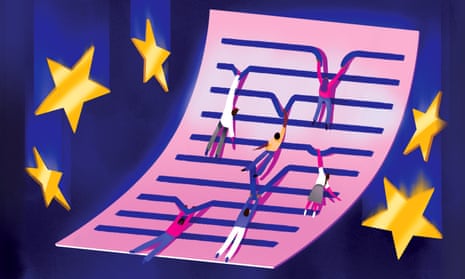A few weeks ago, an old friend posted something on Facebook that stopped me in my tracks. He’s a GP, married to a teacher he met decades ago at university, with three children. They’re the sort of energetic, adventurous, public-spirited family who pitch in wherever help is needed and make me feel vaguely embarrassed about my own civic shortcomings. I have never known him be anything but laid-back, and although he’s originally Dutch, in theory he should have nothing to fear from Brexit: he has settled status, confirming the right to live and work here with his English wife and family after 31 January, just as before. But now he’s fearful. What if, the next time he needs to renew his passport for a family holiday, the computer says no? How can he be sure his life won’t unravel in some faceless official’s hands?
Next week the lobby group the3million, which campaigns on behalf of British residents born elsewhere in the EU, is due to release a report on experiences of seeking settled status. It is unlikely to make cheerful reading. Professor Tanja Bueltmann, the historian and campaigner who oversaw the survey of more than 3,000 EU, EEA and Swiss nationals, says fear and anxiety about what will happen after Brexit is common: “The despair is truly palpable now, and in some cases goes as far as suicidal thoughts. It is beyond irresponsible for the government just to ignore this and expert warnings.”
Ministers have previously dismissed such concerns as scaremongering, insisting those who jump through the correct bureaucratic hoops will enjoy the full protection of the law. But they are reckoning without the toxic legacy of the Windrush scandal, and the profound collapse of trust it triggered. Whether or not these fears are justified, they are the logical consequence of a government that squandered its right to be believed.
The Windrush generation of immigrants were also supposed to have been guaranteed a home in Britain, only for some to be wrongly threatened with deportation decades later. All it took was an ill-judged change in policy whose consequences were not foreseen, followed by a reluctance to admit mistakes when the victims started emerging. What haunts those without British passports now is a fear of being kicked out not just by design, but almost by accident. Amber Rudd never set out, as home secretary, to send British-Caribbean pensioners back to places they hadn’t lived for decades yet it happened, and might be happening still if not for some extremely dogged reporting.
After three interminable years of wrangling over Brexit and a decisive general election victory for its architect, fatigue has admittedly set in for many of us. It’s very tempting to take a break from worrying about something we can no longer change. But up to 3.6 million EU nationals still living here don’t necessarily have the luxury of shrugging and moving on. Curious as to whether my friend’s feelings were typical, I tentatively raised the subject on Twitter this week and was promptly swamped with tales of anger, fear and betrayal.
Several talked of living with a constant hum of anxiety; others of preparing for “another Windrush” or quietly job-hunting overseas. Even mundane brushes with officialdom, like doing tax returns or going through passport control after a holiday, have become charged with anxiety for some who now worry about the consequences of the slightest mistake. And yes, it’s all anecdotal. But this week the European parliament expressed “grave concerns” about the scheme, warning it could lead to discrimination against EU citizens here.
The biggest concern is that people with settled status get no paper proof of their right to be here (the Home Office went for a digital system, which it argues is safer, where status is recorded online and employers or landlords get an access code to check it). But with no official letter to wave, EU nationals worry about their details somehow getting lost in the system, or even hacked. What if the website crashes, or impatient landlords decide they can’t face the hassle and just pick British-born tenants instead? There are fears, too, for up to 900,000 EU citizens who haven’t yet applied. They have until June 2021, but after that could fall foul of Theresa May’s hostile environment policy, which means those without proof of legal status may not even be able to open a bank account.
Some worry, meanwhile, about rights being quietly watered down by future governments or complain of sudden demands to prove they’re eligible for NHS treatment – sometimes after years with the same doctor. It’s stressful for the elderly or very sick, while those who have been paying taxes here for decades feel insulted at being treated like freeloading tourists.
The safest solution is obviously to seek a British passport, but that’s only for those with more than £1,200 to spare and an undimmed faith in a country that increasingly doesn’t seem to want them here. For many, the idea of settled status, guaranteeing their rights while keeping one foot inside the EU, was a good compromise. But now doubts are creeping in.
If faith in the Home Office hadn’t been so shaken by recent history, all these might be wrinkles, easily ironed out with a bit of goodwill. But instead trust has been further eroded by Boris Johnson’s complaint last month about people treating this country “like their own” for too long. For older Europeans, dark memories are beginning to stir. As the3million’s co-founder Maike Bohn says, it’s interesting how many of those involved in the campaign are German: they have been taught since childhood to be hyper-vigilant for signs of foreigners being singled out.
Such fears may not always sound rational, but they run deep. I was shocked when another Dutch friend, married to a Frenchman, said she’d rather leave the country than put her sons on some state register of foreign nationals’ children, but then I remembered something she once told me. Her parents grew up in Nazi-occupied Holland, and she had heard stories of Jews being hunted down using Dutch town hall records of residents’ religious faith, collected years earlier for innocent bureaucratic reasons.
All this makes me feel frankly ashamed and helpless, as 31 January approaches with little sign of political willingness to extend the hand of friendship. The die, it seems, is cast. Yet even now, Bohn says, there are still tiny things that anyone can do to make EU nationals here feel slightly less vulnerable, and one is to stop and listen properly rather than dismissing an anxious friend or colleague with a cheery “I’m sure you’ll be fine”. It isn’t fine for anyone to be made to feel like this. And it will take more than platitudes to rebuild the trust that has been shattered.
Gaby Hinsliff is a Guardian columnist

